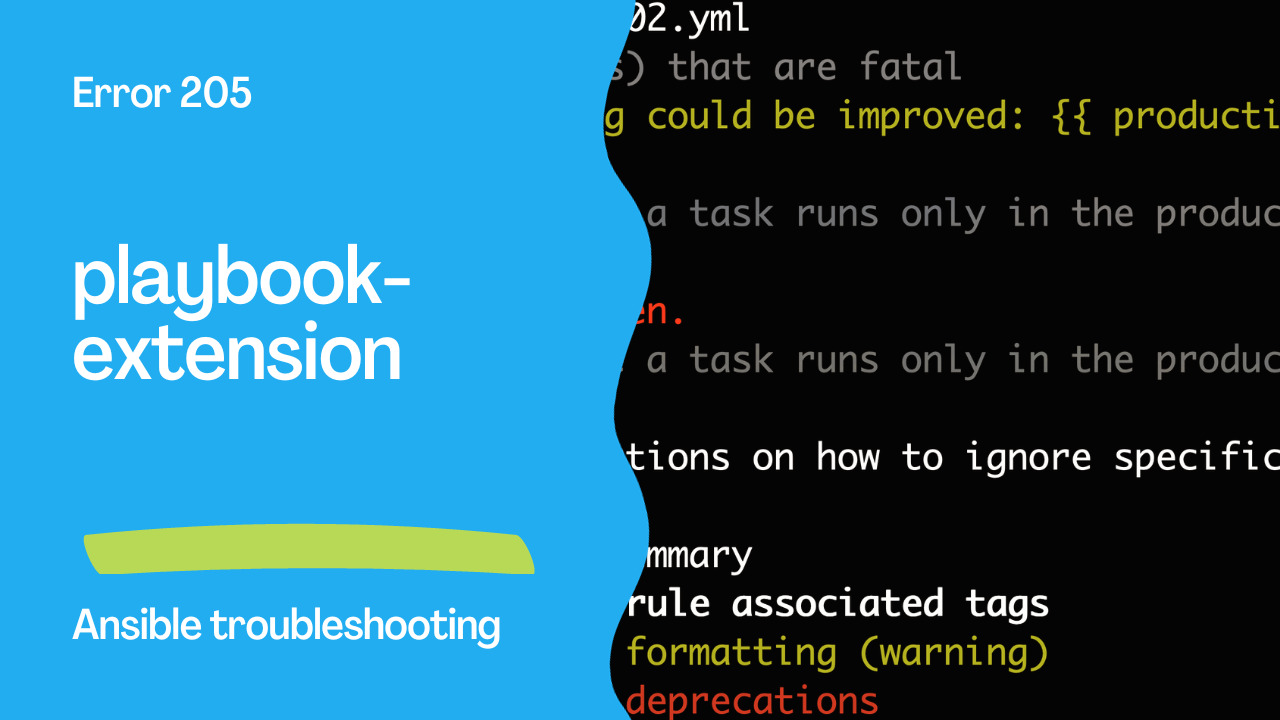Introduction
Ansible, a popular automation tool, simplifies the management of configurations, deployment of software, and execution of tasks through its YAML-based playbooks. These playbooks, expressed in YAML format, are at the heart of Ansible’s automation capabilities. In this article, we’ll explore Ansible Error 205, “playbook-extension”, in Ansible-Lint which focuses on the importance of using the correct file extension for Ansible playbooks. We’ll discuss why choosing .yml or .yaml extensions is crucial and how it ensures the smooth functioning of your Ansible automation tasks.
The Problem: Incorrect File Extensions
Ansible Error 205, “playbook-extension,” is designed to check if Ansible playbooks have the correct file extension. Playbooks should use either the .yml or .yaml file extension, as these extensions are associated with YAML-formatted files, which is the standard format for Ansible playbooks.
Problematic Code Example:
---
- name: Example playbook without the proper extension
hosts: all
tasks:
- name: Ensure some task is completed
ansible.builtin.debug:
msg: "This is a sample playbook"
In the code above, the playbook lacks the .yml or .yaml file extension, which can lead to confusion and issues when managing and executing Ansible playbooks.

Correcting the File Extension
To address Ansible Error 205 and ensure the compatibility and proper recognition of your playbooks, it’s crucial to save your Ansible playbooks with the correct file extension. Here’s how you can do it:
---
- name: Correctly named Ansible playbook
hosts: all
tasks:
- name: Ensure a task is completed
ansible.builtin.debug:
msg: "This is a sample playbook"
In the corrected code, the playbook has been saved with the .yml extension, which is the recommended practice for Ansible playbooks.
Benefits of Using the Correct Extension
- Recognition and Interpretation: The correct file extension (
.ymlor.yaml) ensures that your playbook is recognized as YAML-formatted, making it interpretable by Ansible. - Standardization: Using the recommended file extension standardizes your playbook naming conventions and fosters consistency across your automation tasks.
- Clarity and Best Practices: It aligns with Ansible best practices and makes your playbook’s purpose and structure clear to you and other team members.
- Avoiding Errors: Using the wrong file extension can lead to errors and issues when managing and executing playbooks, which can be avoided by following the standard.
Links
Conclusion
Ansible Error 205, “playbook-extension”, emphasizes the significance of using the correct file extension for your Ansible playbooks. By choosing .yml or .yaml extensions, you ensure the smooth functioning of your automation tasks and adhere to best practices. Consistency and clarity in playbook naming are essential for the effective management of your Ansible automation.
In the world of automation, even the seemingly small details, like file extensions, can have a significant impact on the reliability and maintainability of your tasks. So, when working with Ansible, remember to choose the right extension for your playbooks and enjoy smoother automation experiences.
Subscribe to the YouTube channel, Medium, and Website, X (formerly Twitter) to not miss the next episode of the Ansible Pilot.Academy
Learn the Ansible automation technology with some real-life examples in my
Udemy 300+ Lessons Video Course.

My book Ansible By Examples: 200+ Automation Examples For Linux and Windows System Administrator and DevOps

Donate
Want to keep this project going? Please donate
